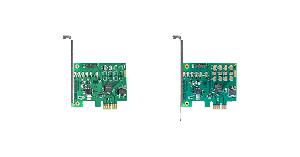ID Quantique launches two high performance QRNG PCIe cards, based on its latest QRNG technology
The new high throughput QRNG PCIe cards use IDQ's latest QRNG tech to provide 40Mbps and 240Mbps entropy data rates and integrate NIST compliant post-processing
Beside classical Business Applications, Gaming is by nature in interest of highest Entropy, today even more as processing power and AI is on a rise. Each game, be it an application or a physical slot, is based on luck and randomly picks lottery numbers or shuffles cards; to do so it has to be based on the highest reliable random number generator.
We from ID Quantique are dedicated to the success of our customers in all areas we contribute with cutting edge Randomness Quality from financial transactions to highest gaming experience.
Although random numbers are required in many applications, their generation is often overlooked. Being deterministic, computers are not capable of producing random numbers. A physical source of randomness is necessary. Quantum physics being intrinsically random, it is natural to exploit a quantum process for such a source.
In cryptography for instance, only systems using a robust, unpredictable source of full entropy that produce true random numbers can be information theoretically secure. Both Pseudo Random Number Generators (PRNGs) based on algorithms and True Random Number Generators (TRNGs) based on classical physics are vulnerable. Since they are deterministic and thus predictable at their core, PRNGs cannot offer full cryptographic security.
ID Quantique’s Quantum Random Number Generators (QRNGs) exploit simple physical processes that are fundamentally random and have the advantage over classical RNGs of being provably secure: elementary components can be easily monitored to detect any failure or attacks, environmental perturbations can be ruled out by simple health checks, guaranteeing QRNGs always produce high quality entropy.
The new Quantis QRNG PCIe-40M and PCIe-240M rely on ID Quantique’s latest patented QRNG technology, that generates randomness from the shot noise of a simple light source captured by a CMOS image sensor. They can serve multiple applications in a server with true randomness, either directly from the entropy source or after NIST compliant post-processing.
Live status verification and entropy source health monitoring performed at component level ensure the Quantis PCie cards always provide the highest entropy, and because any failure or attacks can be detected, they can be trusted to provide the highest entropy from the very first to the last bit.
The Quantis QRNG family exists in several form factors: chips, PCIe, USB and appliance, which are certified market leaders since 2001.
Catherine Simondi
ID Quantique
+41 22 301 83 71
email us here
Visit us on social media:
Twitter
LinkedIn
Legal Disclaimer:
EIN Presswire provides this news content "as is" without warranty of any kind. We do not accept any responsibility or liability for the accuracy, content, images, videos, licenses, completeness, legality, or reliability of the information contained in this article. If you have any complaints or copyright issues related to this article, kindly contact the author above.

